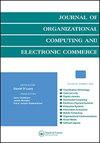基于有序加权平均和模糊度量的协商协议
IF 1.9
4区 管理学
Q3 COMPUTER SCIENCE, INFORMATION SYSTEMS
Journal of Organizational Computing and Electronic Commerce
Pub Date : 2019-07-03
DOI:10.1080/10919392.2019.1587230
引用次数: 1
摘要
谈判支持系统用于交换报价和改进谈判过程。有些方法是基于启发式等视角,使协商协议逐渐接近现实。这些方法在真正的谈判中很重要,因为它们可以帮助提高技能,尤其是在分配谈判中。本文提出了一个谈判支持框架,为谈判者在谈判过程中的决策提供建议。为了将这一思想输入到协商协议中,本文建议将基于OWA(有序加权平均)的一些概念及其一些度量(Orness, Dispersion)包含在结构化协商时间表的启发式中。预期所提供的支持将帮助谈判者在谈判过程中做出决策,从启发和自己的行为中学习所获得的结果可以帮助谈判者在谈判过程中提高自己的技能。本文章由计算机程序翻译,如有差异,请以英文原文为准。
Negotiation protocol based on ordered weighted averaging and Fuzzy metrics
ABSTRACT Negotiation Support Systems are used to exchange offers and to improve the negotiation process. Some methods are based on perspectives like heuristics in order to bring the negotiation protocol gradually closer to reality. These approaches can be important in real negotiation as they can help to improve skillsespecially in distributive bargaining. This paper proposes a Negotiation Support framework to provide the negotiator with recommendations on making decisions in a negotiation process. To input this idea into negotiation protocols, this paper suggests that some concepts based on OWA (Ordered Weighted Averaging) and some of its metrics (Orness, Dispersion) be included in the heuristics of a structured negotiation schedule. It is expected that the support provided will aid the negotiator to make decisions during the negotiation process, to learn from the elicitation and his own behavior the results obtained can help the negotiator improving his skills in the negotiation process.
求助全文
通过发布文献求助,成功后即可免费获取论文全文。
去求助
来源期刊

Journal of Organizational Computing and Electronic Commerce
工程技术-计算机:跨学科应用
CiteScore
5.80
自引率
17.20%
发文量
7
审稿时长
>12 weeks
期刊介绍:
The aim of the Journal of Organizational Computing and Electronic Commerce (JOCEC) is to publish quality, fresh, and innovative work that will make a difference for future research and practice rather than focusing on well-established research areas.
JOCEC publishes original research that explores the relationships between computer/communication technology and the design, operations, and performance of organizations. This includes implications of the technologies for organizational structure and dynamics, technological advances to keep pace with changes of organizations and their environments, emerging technological possibilities for improving organizational performance, and the many facets of electronic business.
Theoretical, experimental, survey, and design science research are all welcome and might look at:
• E-commerce
• Collaborative commerce
• Interorganizational systems
• Enterprise systems
• Supply chain technologies
• Computer-supported cooperative work
• Computer-aided coordination
• Economics of organizational computing
• Technologies for organizational learning
• Behavioral aspects of organizational computing.
 求助内容:
求助内容: 应助结果提醒方式:
应助结果提醒方式:


